#meta anlysis
Text
You know, I think complaints about RWBY not fixing bigotry and class inequality show less respect for these ideas than CRWBY ever did at their worst.
Cos like, CRWBY acknowledge that these issues are vast, intergenerational and systemic. A recurring element of Blake's specific struggle is about how immense the task before her is but the vast challenges of these issues are underline everything .
They cannot be fixed by four teenagers who kind of have a lot on their plate right now already. What's more a "Very special episode" addressing it or "Fixing" it. Be it by unrealistically speedy activism or by killing "the right people" would only come off as disrespectful to the task at hand.
A decent comparison might be how how Reed Richards cannot cure cancer in the comics. On a purely technical level he may be able to but this would do nothing to magically fix cancer in the real world. Thus it would just end up feeling disrespectful to the subject matter.
The same logic applies here, maybe Ruby's silver eyes could erase evil, maybe Robyn Hill could kill all the elitist Atlesians or Blake magically inspire total peace and reparations by doing some activism. But none of these issues would b fixed by such things in the real world, not even close.
So again, we are left with either CRWBY being realistic or embracing childish power fantasy that disrespect the very topics they are grappling with.
186 notes
·
View notes
Text
Daemon and Viserys
The moment in episode 8 when Viserys drops his crown on his long walk to the Iron Throne only to look up and see Daemon by his side was one of my favourite moments of the whole season. It really hit me like nothing else had thus far and I think it’s because of the way that it both heals the rift between the brothers that was established in episode one, and serves as a powerful cumulative moment in each of their individual journeys.
Back during Daemon’s first banishment, Daemon hurled an accusation at Viserys that is very illuminating of Daemon’s motivations. It was that despite Viserys shuffling him around the small council and entertaining his excesses, Viserys had never fully embraced him as he should have, had never gave him his due as his brother.
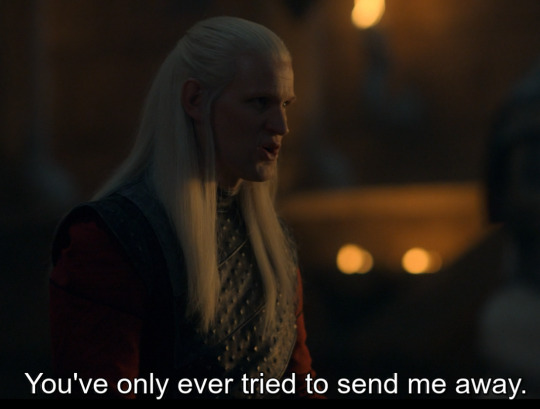
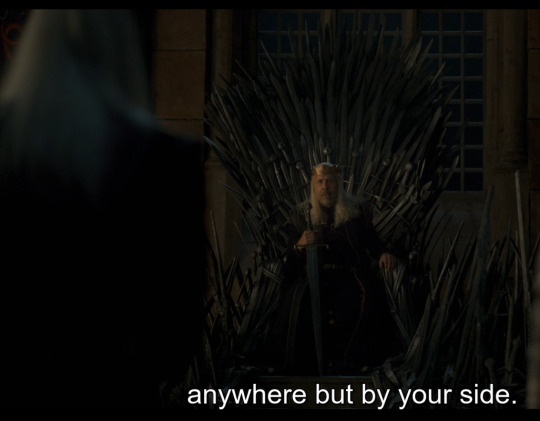
Daemon wants respect, but more important is his need to feel truly wanted. For Viserys to express a desire to have Daemon by his side. He’s scared that even though Viserys may love him, he could make do without him. Conquering The Stepstones by himself was a way to prove his usefulness to his brother on his own terms, but that reunion didn’t last. After another long period of no contact, Viserys once again invited Daemon home, with a position at his court if that is what Daemon’s station requires. For the same reason he chaffed under Viserys all those years ago, Daemon refused.

This hole in Daemon cannot be filled with token positions on Viserys’s council. He wants to be embraced, not coaxed and placated.
On the other hand, Viserys’s main struggle this season was against his own weakness, which Daemon keenly pinpointed during their argument. Viserys’s aversion to conflict allowed others to erode his authority and endanger his own interests. He saw decision making as sacrificing one thing for another, so would prefer to not draw the line at all.
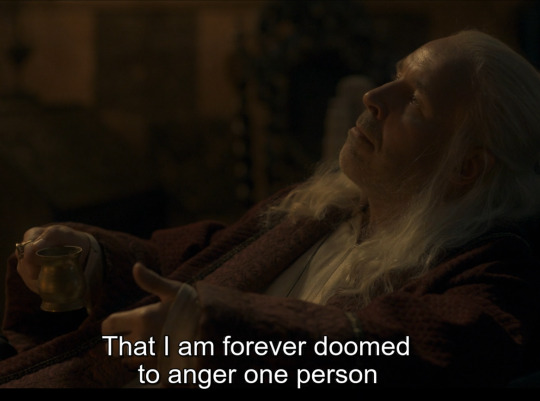
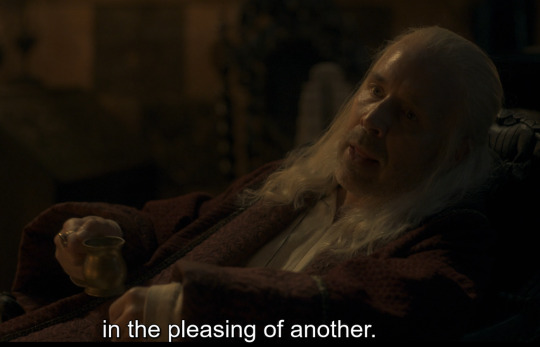
Viserys saw the lack of conflict in his reign as the reason he had never been tested, but it was actually evidence of his failure to set things straight and enforce his will. The test never ceased from the moment he named Rhaenyra heir.
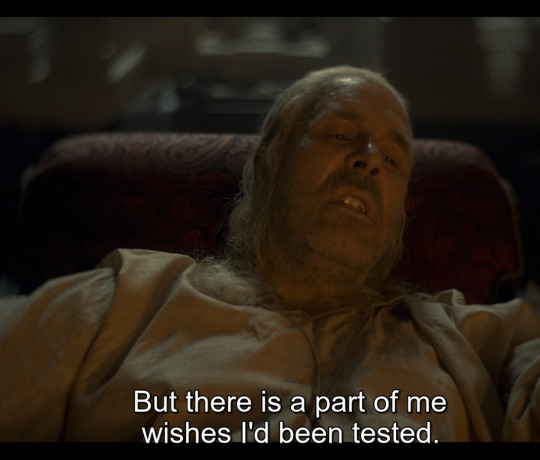
Both of these two currents came together in episode 8. Viserys, despite being at his lowest point physically, summoned the strength to walk to the throne room and sit the Iron Throne one last time. He refused assistance from the kingsguard because he understood the symbolic power of climbing the steps to the throne alone. When the crown drops from his head, however, Daemon is there to help. He encourages Viserys up the last few steps but supports him only lightly, because he now sees that Viserys has found the strength inside himself to be king.
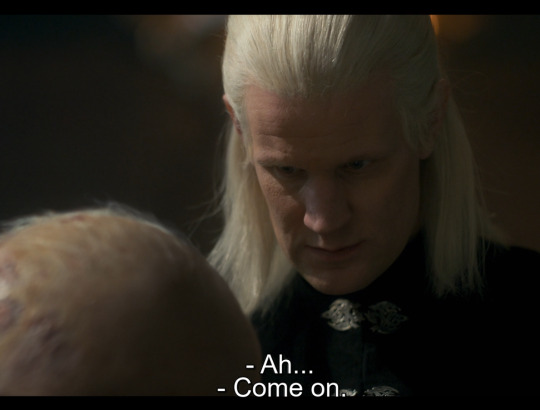
As for Daemon, he finally gets what he’s always wanted to; to walk by his brother’s side, to be leaned on, to be there when his brother needed him most.
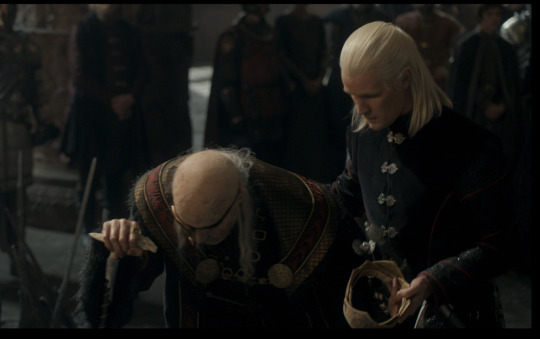
And Viserys accepted his help. It’s beautiful.
#house of the dragon#hotd#Daemon Targaryen#viserys targaryen#king viserys targaryen#rhaenyra#meta#character analysis#anlysis#game of thrones#a song of ice and fire
16 notes
·
View notes
Note
3. any meta you've been dying to share about House MD or House MD characters?
i always think the grief meta is interesting and also the two (2) instances of opera that I can remember.
i might've been reaching when i had this brain blast, but when i was rewatching s2. e2 autopsy the other month (yes that episode), house is listening to nessun dorma. He's listening to it in the locker room then he pauses it to play the sounds of the girl's heart beat for the fellows - he plays the beat of i think 3 different valves & it's the third one that has the issue. in the opera, there are 3 riddles that need to be solved in order for turnadot to be saved. I was like omg.... the riddles.... i was just looking up the song again to remind myself of what my thought was at that point tho and found this that someone else wrote about it! I dont agree with everything they wrote but they also have a bit of meta anlysis about the opera in regards to the episode!
Then i thought it was interesting that wilson mentioned feeling like he needed to go see la boheme in 5.22 (when danny is found and wilson takes a walk without a jacket). la boheme, the opera where the very opening lines of the entire show are about how cold the characters are. because they are poor. (rent is based on la boheme, for context). the opening song theyre debating what to burn in the fire for warmth and complaining that they are hungry for lack of food. in the episode where wilson "wants to see what it would be like to be homeless in a new jersey winter". and he says he hates opera. okayyyy big guy suuuure.
16 notes
·
View notes
Text
The theology of Attack on Titan

I am not a theologian, so my knowledge may be wrong and is based on books I have read so far. Please don’t blame me.
I have already written two posts on possible theological reasons for Attack on Titan. Continuing to read I found several other issues that seem interesting to me. It will certainly not be my last destination in this regard, but I like this topic too much and I wanted to introduce it anyway.
First of all, Ymir Fritz is introduced as a mythical ancestor similar to the one of the Abrahamic religions, Christianity, Judaism and Islam. Despite her design, which recalls Norse mythology, her place in the three monotheistic religions is indisputable because the ethnicity to which she refers. Eldians are an allegory of the Jews and not only under a theological point of view, as Paradis is an allegory of the State of Israel from a political point of view. King Fritz seems to be the bearer of a Zionist-like ideology, since he took a land for his own needs but with other ethnic groups present on it: this is because the Eldians - like Jews - evidently felt they could not live with other populations and the need to take refuge in a part of the world to live in peace. The power of the Giants in Marley's vision (placed in a WWII setting is a bearer of Nazi ideology) could symbolize the great Jewish financial power of those years.
Eldians also call themselves "the people of Ymir", as Jews define themselves as God's people. The Eldia restoration movement is convinced that it is chosen by the forefather Ymir. In the biblical tradition the giants are called “Nephilim” and are the consequence of a carnal relationship between fallen angels (i.e. the legions of the devil) and mortal women. There is no need to specify that from a religious point of view, the carnally union between the spiritual world and the physical world is considered blasphemous and can only generate curses. Other theories see giants as historically existent people with an extraordinary strength, just as Ymir is experienced both as a spiritual and mythological being and as a historical figure. Her being the Abrahamic progenitor is based on her historical dating in the universe of Shinjeki no Kyojin, i.e. 2000 years before the events narrated and the birth of Eren (which in the series represents the messiah), exactly as the figure of Abraham is dated 2000 years before Christ.
The various depictions of Ymir see her entertain some kind of relationship with a demonic figure and her name varies in the literature from Ymir to Krista. Therefore, it is not to be excluded that the monster and Ymir had some relationship, from which the curse of the giants was generated and that, therefore, according to the biblical tradition, it was a relationship between a demon and a mortal. There is no doubt, in fact, that the giants are a curse and is confirmed by the testimonies of different characters in the series. Even Frieda is described as "possessed" in some moments, as if she suffers a demonic possession: whoever is possessed by the power of the giant lives a state of such profound desperation (which someone in theology defines as "the dark night of the soul") that does not leave other solution but suicide.
In almost all the confessions of Christianity, original sin is the one that Adam and Eve, forefathers of humanity according to the biblical tradition, would have committed against God, as described in the book of Genesis. This is in fact the genesis of the Jewish religion and its people, such as the relationship with the demon of the earth and the sin committed by Ymir (of which the apple is a symbol in rock painting). In any case, Jews do not believe they have inherited the "guilt" from Adam, but only the consequences of his reckless choice. In the same way Eldians do not have a real fault for the sins of Ymir (even if they have decided to expiate it), but they suffer the consequences. In any case, Adam is recognized by some currents as the one who brought death into the world through his disobedience. Another issue is the concept of expiation proper of the Marley's Eldians, who pretend to take on their shoulders the sins of their predecessors in order to extinguish them definitively. In the Jewish doctrine, unlike the Christian one, there are no sins that can not be expelled and everything can be extinguished through repentance and sacrifice. This is what Marley's eldians do and in particular we are made clear by Gabi in her speech with Kaya. In this sense also the number 13, which are the years of life remaining to those who inherit the power of the giant: the number 13 is the number of death and rebirth and who lives under the number 13 has the possibility to conclude what is left unfinished by its predecessors.
Ymir, however, is used by the peoples according to the cause and nothing is actually known about her and her truths. It could also be considered a founder really existed, unlike Abraham which is part of the myth and not historically proven. Unfortunately nobody knows the truth and probably nobody will ever know it. I have already mentioned in a previous post that for me Attack on Titan is the story of a people passing from the Old Testament to the New Testament. This is based on the religious vision within the walls, which is much more similar to the old beliefs than to the new ones. At the beginning of the series, when the giants break through the walls, a man makes a speech about how they are deserved, because they have sinned in different ways. The concept of "bad people happen bad things and good people happen good things" is a custom, probably dating back to a pagan period, in which if a lightning struck your home was because you had sinned against the gods and were punishing you. This concept is discussed in the book of Job, in which this upright man is struck by one misfortune after another and not because he has sinned against God; rather, he is described as his most faithful servant. Representing Eren a messianic archetype, and being the protagonist and therefore the one who is destined to resolve the story, the idea is about a travel from from the ancient testament of Abraham (Ymir) to the new testament of Eren. The division of the world of Eren in black and white, as a matter of fact, is continually discussed and criticized and must learn to love his enemy and understand it, and this is the supreme teaching of Jesus Christ himself. Eren, however, is a bridge between the religious vision of Christianity of Messiah chosen by God (since it would seem that all events are controlled by Ymir or a higher spiritual force) and the atheist one of Buddhism, in which through its path will ascend how to be perfect (eliminating its narrative flows). Moreover, it would also seem to be in common with the Davidic messiah, who opposes and defeats the opponents and even the first King presents similarities with the figure of David (David fought against the giant Goliath, but he was a man like Marley's men): the final Jewish goal is realized in a Davidic monarchy that the messianic advent should restore. The oppression of the giants settled on their land deprives the liberals of the eldians of Paradis like Roman people settled Palestine in the times of Christ. The Jewish messiah refers to a human leader, a physical descendant of the lineage of King David, who will rule and unite the people of Israel and lead him to a messianic era of global peace, and this is also what Grisha and Dina saw in Zeke. The Jewish messiah, unlike the Christian one, is not considered divine.
The departure of the Eldian people as people of the Old Testament is also underlined by the original Nine giants: as the Jews originate themselves from the twelve tribes of Israel, it seems plausible that the Eldians originated from the nine giants. The third ending, then, represents a mass exodus (where the diaspora is the symbol of the Jewish people and its sufferings) in the desert and towards a light. The desert is a place of expiation. The end of the ending shows a painting by Ymir with the Giant Nine, but there is a fracture on her face. Giants are considered chaotic beings, but the term "chaos" has not always meant disorder and originally meant fracture.
About a possible conclusion of the series, I like hazard a theory. According to some biblicists, the struggle between Gog and Magog described in Ezekiel should take place at the end of the days, where this term means an event with catastrophic consequences at the global level, such as to cause the destruction of the earth and the human species. The threat of the giants inside the walls that will devastate the world can not be left to a mere quotation, but given the cumbersome presence in the series it is highly probable that this will actually happen at the end (moreover the walls will somehow have to be turn down). Gog and Magog up to the legendary populations of Asia, cited first in the biblical tradition and then in the Koranic tradition as wild and bloody people, source of looming and terrible threat or however identifiable as negative entities. These are the two mutually contrasting factions, as Marley describes eldian people with millennia of rapes and devastation behind them and which threatens the world with the giants, while eldia from Paradis sees the Marleyans as people without hearts and bloodthirsty who unleash on the island giants without brains and really violent.
The assumptions are those for an apocalypse, in what was initially presented as a post-apocalyptic manga
50 notes
·
View notes
Text
20th Century Boys and understanding Fukubei
TW: spoilers of 20th century boys.
Btw, my native language is not English so beware any mistakes :)
I like Naoki Urasawa's work. A lot. And I like noticing parallels. A lot too. So it's interesting to see how many of the ideas he used in 20th Century Boys pop up in Monster. The most important one probably being the identity problems his antagonists face.
You see, Johan and Fukubei share more than style. They are both men that barely understand themselves. Johan is a monster with no name and Fukubei is a man with no face. Their poor identity stems from the context they come from: one faced the aftermath of war and was the result of scientific experimentation, the other one lived through an era of hype for future progress that could never live up to its expectations. Now, in this... meta? Rambling? I'm not gonna do a deep dive on Johan cause there are far better essays analyzing him. I'm just pointing one of the many similarities between 20th Century Boys and Monster cause it's fun and I need an introduction before I dwell unto my subject: Fukubei.
On one of the first times he's introduced, he's showing his back to us while answering a question from his follower. Right there, he says he's Collins. We'll see this point being repeated over and over with him finally discussing it in far more detail the night he's killed in the science room. He's Collins because he was so close to the moon but never got the change to walk on its surface. He was overlooked and forgotten. No one ever paid attention to him.
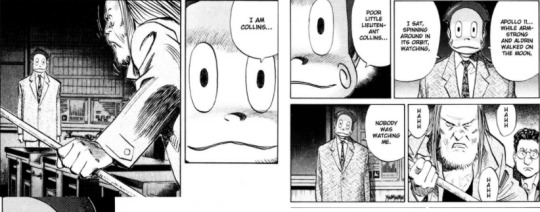
It's clear what Fukubei wants: attention and recognition. The first person who notices him and spreads his story about the expo is Kenji and without him knowing, he gives Fukubei the thrill he was looking for: the feeling of being alive.
That's how Kenji became an important part of Fukubei's journey. He wants to be like Kenji and he wants his attention. I won't go into detail about their relationship cause I want to dedicate it its own post, but this is enough info for now.
To be honest I’m a bit inclined to believe Fukubei wanted friendship, but instead absorbed others. This all thanks to his poor grasp on his identity: he doesn't know where he ends and others start.
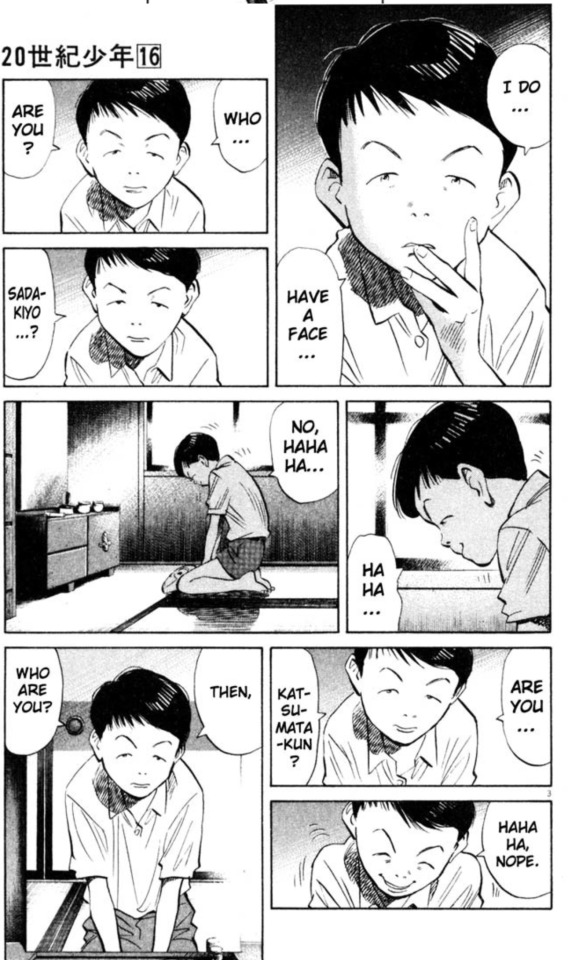
Also, let's note that Fukubei doesn't identify with either his name or Hattori. When he meets Sadakiyo, who is confused what to call him, Fukubei replies he should only call him friend.
And in that point the term "Friend" encapsulates Fukubei's emptiness. His lack of connection to his identity that it would only get worse as time went on.
This manga is full of motifs. One of the most important being the teru-teru bozu which captures the complex relationship between Fukubei's sense of self and his lies. The teru-teru bozu is introduced as a symbol of deception and tricks. Later we see many panels of Fukubei identifying with it.

Also -and this is me using the opportunity to share all of the screenshots I took of this manga- let's see when the narrative parallels him to the teru-teru bozu.

Just like Fukubei says when Sadakiyo asks why not draw a face on the teru-teru bozu: it's scarier without one.
There's a pretty big emphasis on how lies impact Fukubei's identity. They are there to compensate for his lack of identity. He believes his own lies and he later identifies with them so much being called a liar offends him. Again, let's see his reaction when Donkey calls on his bluff, and when he says to Manjome what he wants.

And...
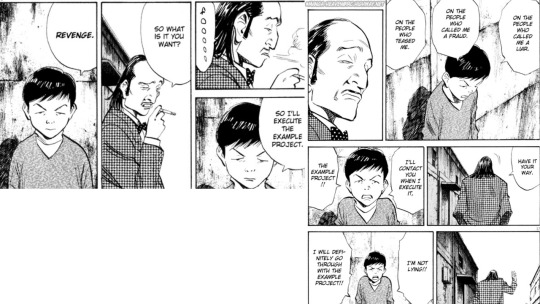
Now, Fukubei refuses to acknowledge that the world is out of his control. Let's look at his death scene. How surprised he is of his own mortality. Another example is in chapter 172, one from his pov when he says "My dream is not a dream. It is not a dream, because it really will happen.” Look at the refusal to face the world.

Before I deep dive into a question I have about Fukubei, I would like to talk about the meaning of lighting a candle in the science room just to pay attention to Urasawa's amazing use of symbols. When Donkey steps into the classroom, he reveals Fukubei's miracle to be a trick. When Yamane waits for Fukubei in the classroom to kill him, he reveals him as a liar. Both Yamane and Donkey are men of science, lightning a candle in the middle of the darkness to dissipate the illusions and bring back reality.
Also, they both killed Fukubei in a way. Donkey by ruining Fukubei's miracle and Yamane straight up killing him.

In the science room Fukubei "died" and Friend was born. Friend is this persona, this literal mask people with shaky identities use to hide behind it. After Donkey ruined Fukubei's act in front of his group, Fukubei takes refugee in Friend. Friend is on top of the chain. He is the leader of the cult, the world president, the one who foresees the future. And by merging with him, Fukubei validates his own existence through the validation of his tricks as this persona.
And this mergence was doomed to happen. To hammer the importance of lies for Fukubei's identity before becoming Friend, let's see this panel of Yamane in the science room.
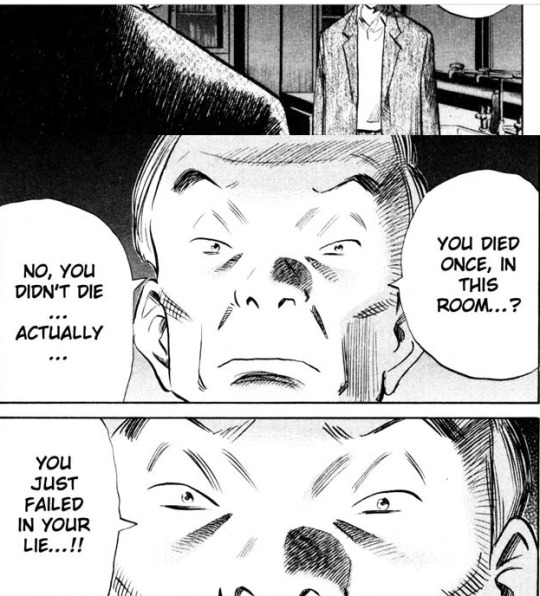
I know many people are intrigued about Fukubei's Friend, but I like Fukubei's backstory more. Especially when we start talking about The Hanging Hill, and a question that pops up while reading that part. Why can't Fukubei see the real ghost?
There are many ways to interpret the scene. The most logical being that maybe this part is there to remind us of Fukubei's inability to see the truth. But was this inability predetermined? Did he develop it? Does this mean that because he can't see the truth, his path was doomed to only see lies? How much agency would he wield in that case? From this reading, some readers might infer that Fukubei is probably mentally unwell. Personally, I'm not a fan of diagnosing characters with something. Maybe because if the story doesn't explicitly say what the character has (in that case, I can judge or seek others to judge how accurate the representation is), the writers code their characters with an agglomeration of characteristics from different mental disorders. Honestly, I won't dip my toes in these waters. Just a thought that occured while reading.
By the way, what Kenji, Occho and Sadakiyo saw in that room was a noppera-bo: a faceless ghost.
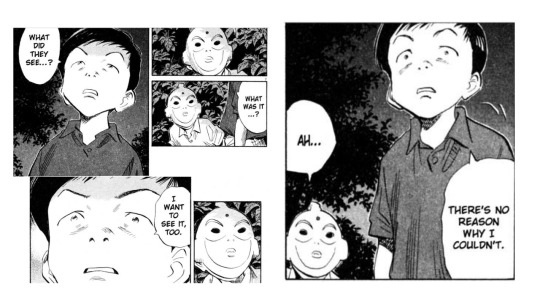
In case I forget this in my next essay about Katsumata, it's interesting how just like him, Fukubei had to die before Friend was born. Kinda highlights the unspoken importance of personas in this manga and its influence on the world.
Finally, this leads me to the heart of this post and the next ones: 20th century boys take refugee in Friend. Behind his mask, these men hide their fickle identities and their disillusionment of the future by trying to turn it into what they desire it to be. One of the most important themes in the manga are the acceptance of reality and the process from childhood to adulthood. Will you hide from reality and force the world to bend to your desires? Or will you accept the world as it is and take responsibility for your actions?
One last thing: I love how Urasawa tears down the image of Friend and shows how pathetic and sad the lives of those men behind the mask were. And all of this without justifying their actions. Urasawa doesn't let Friend's lies captivate the reader. He shows the ugly truth behind it. Many times in media, we mistify evil. Maybe because it is in its very nature to be mistified or maybe its in ours to mistify it. Either way, we understand what caused the birth of this persona and maybe for all us, 21st century people, this is the best advice we can receive from someone from the past century.
#20th century boys#anime#anime / manga#manga art#katsumata#fukubei#friend#naoki urasawa#shonen#johan liebert#naoki urasawa's monster#meta#21st century boys#fukubei hattori#sadakiyo#y'all how come I haven't found metas about this manga?#I went to hell to find it and I found nothing#honestly#nobody tells me fukubei was dead all along cause 1. that ruins my anlysis and 2. that ruins this manga#ngl i laughed
93 notes
·
View notes
Text
NANA discussion: The anime ended at the right moment.
So, let me get this clear, I am not familiar with Ai Yazawa's other works. Thus, I don’t know if there's a certain way she writes her stories or her writing style. So, I want this meta to be focused on the narrative of Nana only.
Nana manga isn’t finished yet. It’s on hiatus since 2009 for health issues. I have read that she plans to continue but that news was of 2017. It's been 3 years since.
I get attached to the characters and narratives too much. I am sure it’s not only me. Nana anime ends on ch-42 of tge manga. The last released chapter was 84.
It’s only half-way through. But something about the anime is hopeful. It shows us that things sort out. Since the story is heavily romance based, let's compare the relationships between the manga and anime. In the anime, Hachi and Takumi are happy. They have a daughter. The mentioned Ren might be their son but he might also be the Ren watchers are familiar with. Nana isn’t there but as Yasu says that Ren went to his home, if we think of the mentioned Ren as the member of Trapnest, it is safe to assume that Nana O is with him. Nobu feels sad but he and Nana K are on good terms. Yuri and Miyu aren't mentioned but it is safe to assume that Miyu and Yasu are, if not lovers, good friends as she's the only one who can bring out Yasu's true self. Shin and Reira, as they have already sorted out their age gap and ambiguous relationship problems, might be together. Shoji and Hachi have finally sorted out everything and they can finally have some peace of mind. After all the obstacles, they are in a good place.
In the manga, however, Hachi is unhappy in her marriage. Takumi remains unfaithful. Nana O is missing. Ren from Trapnest is dead. Reira gave Shin hope and then broke up with him for Takumi. Yasu and Miyu ended up together tho.
This comparison is enough to show that things don’t work out and there is no hope. I am sure Ai sensei has something on her mind but the place where the manga has stopped isn’t a good place. As an emotional reader and watcher, I feel sad and hopeless. It’s too long already. Even though I watched the anime recently, I know the plotline and I think 11 years is too long to wait. I will continue once the manga continues but a lot of readers has already lost hope, not for the manga, but for life. Once someone absorbs a material and feels it, their way of thinking changes. Feelings don’t care whether the story is completed or not.
I would totally love to read the manga once it start again but until the narrative ends, I think it's better to stick with the anime. Because it has a conclusion, satisfying or not. All the stories I have read or watched that don’t have a conclusion have only gave me restlessness.
#nana#nana komatsu#nana anlysis#osaki nana#nana osaki#nana anime#shinichi okazaki#reira serizawa#yasushi takagi#nobuo terashima#hachiko#ren honjo#meta
108 notes
·
View notes
Text
thoughts on some of the details i loved in little graduation:
-little graduation is bookended by steven driving in his car, a symbol of maturity and freedom, but also a symbol of aimlessness. at the beginning of the episode, he has someplace to go, people to see. at the end, he’s alone, in a scene that feels reminiscent of the very wistful end credits, staring into the stars at what could represent lars, infinite possibility, his own baggage, and more.
-steven’s floating was screwed up when he saw shep, foreshadowing his lack of emotional control. sans the movie, boy hasn’t screwed up using one of his non-pink mode powers in ages...and now we get a pair of episodes when his powers are running wild.
-steven keeps assuming he knows how people feel. his eq has always been off the charts, but he’s not clear-headed, anymore, and that’s throwing his barometer off a lot. no wonder he thinks he’s losing his touch.
-and we see the cool kid’s futures. steven’s only a couple years younger than all of these people. it’s putting a lot of subconscious pressure on him, how together everyone is--and i think the whole point is that they’ve grown in ways that have made them able to face the future. like greg said, growing up is a choice.
-”who here loves sadie killer and the suspects? well, our band tonight has only one of them.”
and lars this entire ep is just like, “this is my penance for being an asshole when i was a teenager. true friends put up with friends even when they’re being tools.”
-not “lars, PLEASE STOP!” it was “lars, STOP!” yeah, that feels important.
-steven’s pink mode powers seem to be manifesting in more and more unformed, basic geometrical shapes, similar to pink!steven.
-steven’s dome itself was made entirely out of pink diamonds. this is in no way, shape, or form paranoia provoking.

-nope nothing concerning here
-sadie’s dating someone and experimenting with a new sound, lars and sadie are now able to have healthy conversations about their relationship, lars is able to talk about uncomfortable and personal topics in front of a crowd of people without panicking and lashing out, and he can hug his friends openly? yep, this? this is Growth.
-and seriously having steven being an asshole and lars being the reasonable one feels *strange*. haven’t seen this since the good lars, another episode where steven was overly controlling. HUH. almost like this is the boy’s big character flaw.
-”wouldn’t be the first time.” that’s some good pastel gallows humor right there.
-”you’re trying to figure stuff out right now, and you want your friends around to help you through it.” this feels important, too. they kind of skim over this, but i think it’s the heart of the matter--steven wants help. boy’s crying out for it. but he doesn’t know how to ask for it.
-we see a partially eaten pizza next to steven at the end of the episode, continuing future having the kid who used to start out every other episode making some of snack barely eat on screen. (only time i can think of is rose buds. UMMMM.) not to mention Mr. Big Eater seems to have had a couple of slices and tapped out, not to mention pizza’s been used to symbolize togetherness several times and he’s eating it by himself.
-steven’s really mulling over those lines, “i’m looking forward now.” at first, in the car, he seems to be getting into it. but when he’s looking at the stars, reflecting...he looks concerned. a bit upset. you can really see it hitting him--what does forward mean?
#su#su future#su spoilers#steven universe#su meta#character anlysis#character reference#god i have infinite thoughts on these episodes#so much going on here with steven
653 notes
·
View notes
Text
Memory & memories in Noragami. Part 1
What are the works of fiction that get stuck in our minds and souls, making us spend hours thinking over a single line a character said that one time, look up information on a foreign culture, write long-ass meta posts in thematic communities? That’s right, the ones that have something to tell us.
Noragami has a lot of themes that can interest readers of all sorts: child abuse and its consequences, free will and the ability to choose your own path, ideas on what true human nature is. However, in my opinion, the central theme of the entire series has been the that of memory and memories, the one that found its way into every main character’s storyline. Yato wants to stay in the memories of the living because the alternatives are to disappear or to be an eternal slave to his father. Hiyori doesn’t want to lose her memories of the Far shore, which effectively prevents her from living a normal human life. For Yukine and other shinki the memories of their human lives are a direct threat to their very existence, and right now the boy is too far gone to turn back. The importance of this theme to the series’ narrative and my personal interest resulted in this analysis of different aspects of Noragami that relate to memory and memories. It’s a huge theme, so instead of writing down a biiig longpost I’ll divide it into several smaller ones. This is Part 1. Memories and gods’ reincarnation.
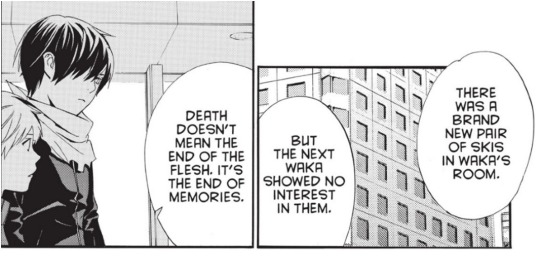
The relation between reincarnation and memories can be examined in two different yet intertwined directions: the mechanics of rebirth, which has to do with the believers’ memories, and its aftermath, i.e. the loss of god’s own memories.
We all know how gods are able to reincarnate: they simply need people to remember them. Their names play a huge part in it, since those are what give humans something their memory can latch on. After all, believers don’t usually become friends with gods and shinki, like Hiyori does; they pray to gods knowing only their names and what they do. Of course, gods also have images of them, but those mostly reflect people’s ideas of what a god should look like based on their functions, and they have nothing in common with the gods’ real appearance (in Noragami). A name in its usual meaning isn’t a necessary requirement either: Kofuku goes by binbougami, or god of poverty, outside of her immediate circle of friends, with her “profession” substituting a given name.
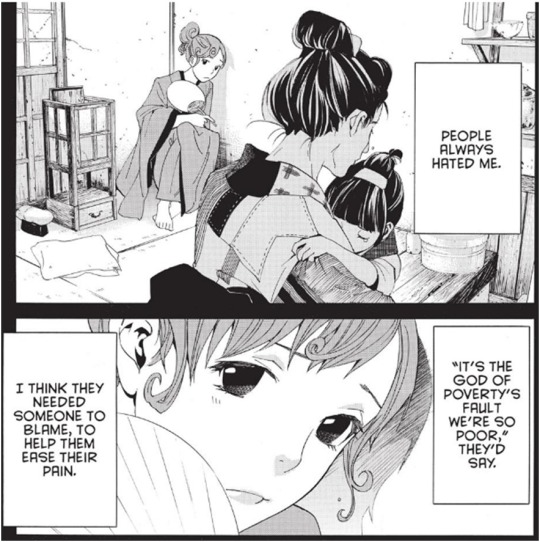
A god who has a name (a personal one or, like Kofuku, something that stands in for it) can be reborn as long as there are living humans who remember them, because it means that the god is needed, that their existence has a meaning to it. I think that this dependency on humans’ memories is the reason why gods don’t retain their own memories after rebirth.
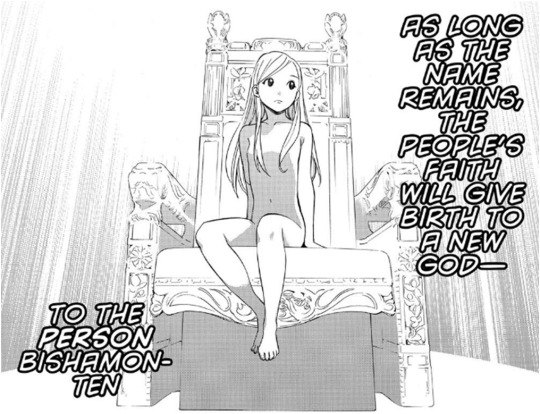
“Person” here doesn’t refer to a god’s individual personality traits, but to their so-to-speak material form – the idea that there’s someone out there who can help you solve your problems materializes in an entity shaped like a human. Therefore a reborn god shouldn’t have any memories, because the reincarnation isn’t their choice, but a response to people’s needs. Except humans don’t and can’t possibly know anything about a god’s personal history, so they can do nothing to help him or her retain their memories. Besides, it’s not like a god needs to have a personality, goals and ambitions; all they need to do is fulfill their role, do their job. And yet, while they don’t have any memories, newly reborn gods still have some sort of an instinct that lies in the core of their character.
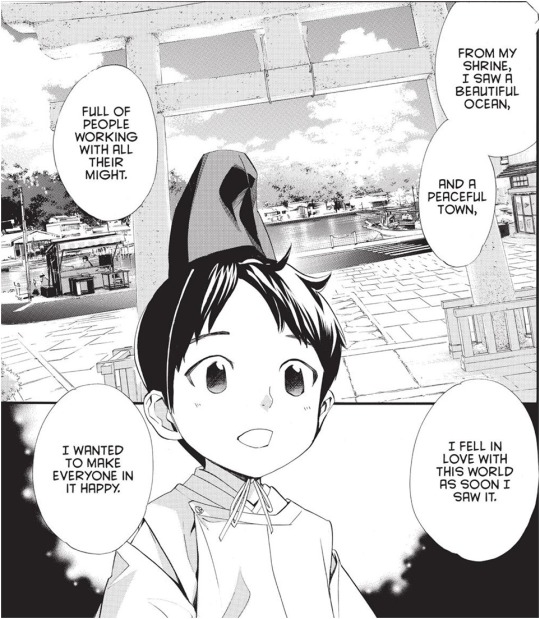
Now, even though I’ve just said that gods shouldn’t have any memories after reincarnation, is that really the case?
Two scenes from the manga gave me an idea that, perhaps, gods can remember at least their names – the ones that they are commonly known by among humans and contributed to their reincarnation the most.
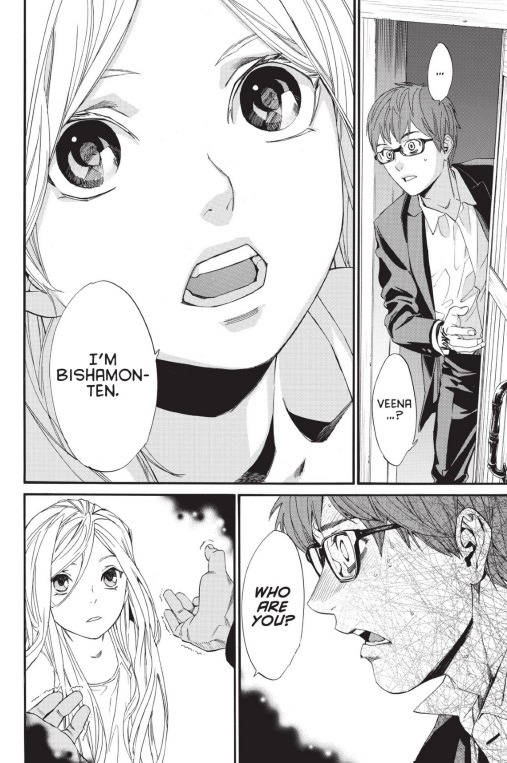
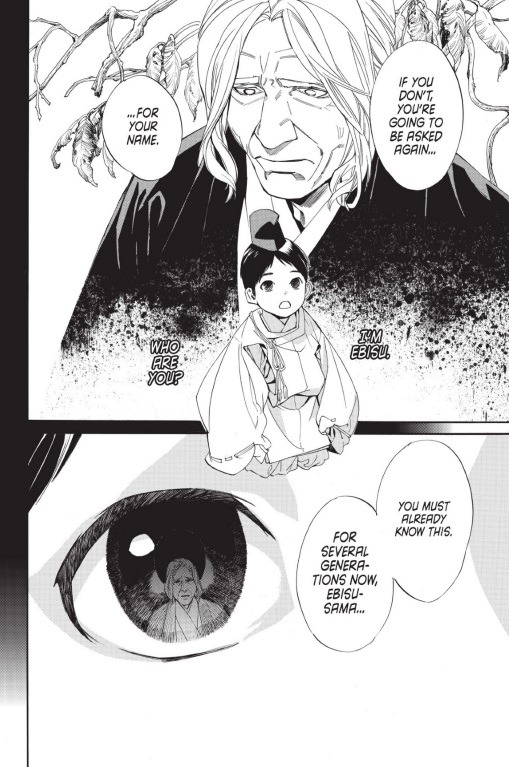
Neither Bishamon nor Ebisu seem to remember their guideposts’ names after being reborn, but provide their own names instead. Keep in mind though, that neither scene is corroborative evidence that this is canon. Bishamon’s replacement was only Kazuma’s premonition that (as of now) hasn’t come true. Kazuma has been and will keep doing anything to preserve the current Bishamon; he will kill and betray as many times as needed. It’s only natural that Veena’s rebirth and the loss of her memories would be his worst nightmare. As for Ebisu’s case, everything’s not that simple either. After his execution in chapter 35 he reappeared at his Miho shrine – compare the image of Ebisu above with the IRL picture of the shrine’s torii:
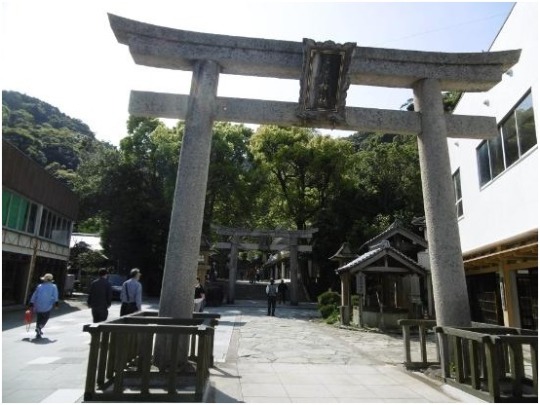
Miho Jinja is one of the largest Ebisu shrines. It may be that, in Noragami universe, it’s his main shrine where he usually reincarnates. When he was hiring a new bunch of noras in chapter 73, he did that at his Miho shrine, too.
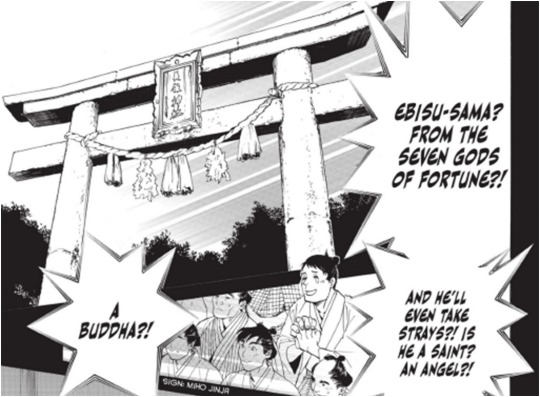
And even if Ebisu reincarnates at a different shrine each time, Iwami is unlikely to be there, too, since he’s probably in Takamagahara. It means that Ebisu could have learnt his name from his other shinki that stay at the shrine before meeting his guidepost. Still, the fact that the authors bothered to include these scenes in the manga could mean that, theoretically, gods can remember their names after reincarnation. It’s not that far-fetched considering the god’s dependency on humans’ memories. People may not be able to preserve the god’s own memories, but at least they can give them their names back.
Another interesting thing about reincarnated gods was shown (though not really expanded upon) in chapter 86. In that chapter we’ve learnt that various incarnations of Ebisu have a habit of burying a box with his complaints and fears in the exact same spot, and every new Ebisu finds it sooner or later.
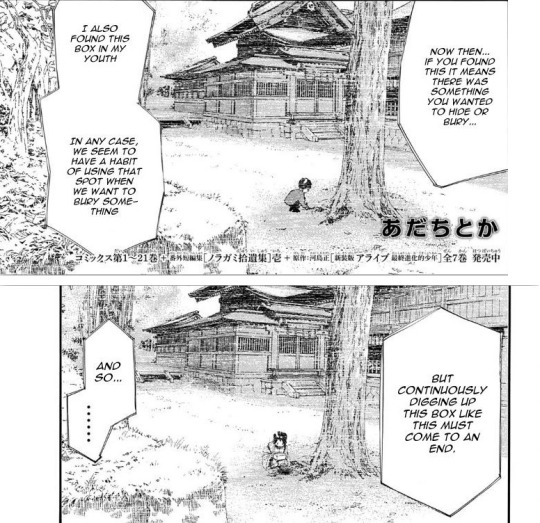
The late Ebisu says that all of his incarnations have been discovering this box whenever they wanted to hide or bury something and would subconsciously choose this place. This time wasn’t an exception: mini-Ebi found the box when he needed to bury his seahorse Takemika. The late Ebisu used this peculiarity of his to his advantage, burying a USB-card with information on the sorcerer alongside all the other stuff in the box before going off to Yomi. He gambled on the next Ebisu needing to hide something and finding the box, and didn’t lose (he is a god of fortune, you know).
By the way, the place where Ebisu keeps hiding the box is, again, his Miho shrine, where he reappeared after being slain and where he was hiring noras when Kunimi came into his service.
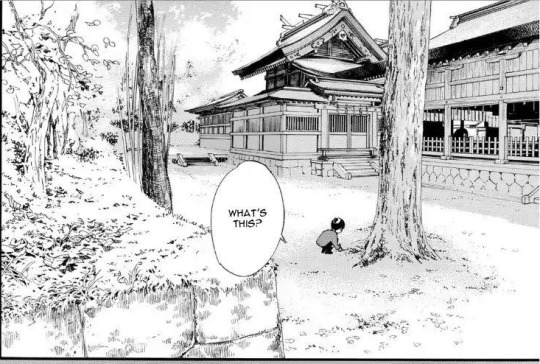
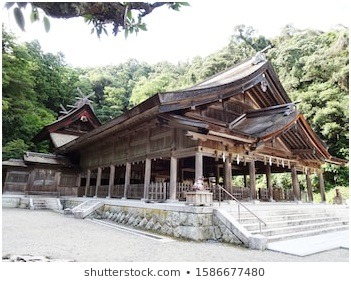
Why does every Ebisu keep coming to this spot to hide things? When Takemika died, Ebi didn’t seem to have some sort of realization that he needed to come to this particular place. He probably didn’t want to dig a grave in Takamagahara, so he used one of his biggest shrine (or maybe his main shrine) to come down to Nakatsukuni and bury his pet there. Yet somehow he ended up choosing to do that under the same tree that all those other Ebisus have been spotting, too.
Does it mean there are still things left to discover about gods’ reincarnation? Is Ebisu unconsciously drawn to the shrine that seems to be his starting point after each rebirth? As of now, we don’t know.
P.s. I keep thinking about a sentence I wrote earlier, that gods lose their memories because their believers don’t know them personally. Hiyori knows Yato, they have lots of memories together. Can this mean that if Yato dies and then reincarnates thanks to Hiyori and not Father, he will be able to retain at least the memories that are tied to her?
#noragami#noragami manga#ebisu#bishamon#theories#I thought I would be writing about the importance of memories but ended up doing an anlysis of the lore#maybe next time#noragami meta
57 notes
·
View notes
Text
Ren’s gift for Nana

@watashinosora Thank you for your question, I’m always happy when other fans of the manga/anime I follow ask me questions! ^-^
The answer to your question is hidden in my loooooong on-going conversation with @merrygloom, but of course since we are analyzing many things it’s easy to miss the single topics, so I decided to answer you making a separated post.
There are many theories/opinions about Ren’s gift for Nana and they all can be possible, but personally I’ve always thought that the gift is a song for Nana, more specifically a recorded tape. And now I will list all the reasons why I think it:
- The size of the package and its shape are the same as the one of a recorded tape. We have seen different times in the manga people using recorded tapes (I remember that scene when Reira is in her hotel room with Shin and she’s listening to Ren’s song and she has to write the lyrics but she’s not able to do it) and as I said the size and the shape of this recorded tapes reminds me of the little package Ren made for Nana.
- Ren was frequently re-thinking about Nana yelling at him “don’t write songs for other women!”. In the last chapters before and after their separation, Ren re-thought many times about those words, he reflected a lot about them. I don’t think this is only a coincidence.
- The ribbon that he used to decorate the package is the same that Nana was wearing on her neck the day he asked her to be the singer of his band (Blast).
This third point is the most important for me. Nana uses to tie that ribbon on her microphone during her live concerts, almost like if she wants Ren to be always with her, because that day he asked her to be the singer of his band had been the beginning of the happiest period of her entire life.
(And if you want to read a little more about the ribbon and Ren playing songs for Nana I’ll leave you the link to another post of mine where I made an analysis of the possibile hidden meanings behind Kuroi Namida’s video ---> HERE)
Another thing that makes me think the gift is a song is that Ren was carring his guitar with him: if he only had to go to fetch Reira, take her back to Tokyo and then go to see Nana, he didn’t need his guitar at all. But if the present was a recorded tape, maybe he wanted to play it live with Nana (just like Nobu did when he came to Tokyo).
So yes, this is my personal opionion :) But I agree with you that this gift will reveal a lot about how the story would have gone (what where Ren’s real intention, what would have Nana done or maybe has done, the future of many characters). I hope one day we will finally know what it really is.
What about you? I’m curious to know your opinion about the gift! ;)
#nana#nana meta#nana anlysis#ren's gift#ren honjo#nana osaki#my personal opinion#nana's birthday#ai yazawa
33 notes
·
View notes
Text
Summary table of the adverse effects of vitro Toxicity typical and atypical antipsychotic drugs
Summary table of the adverse effects of vitro Toxicity typical and atypical antipsychotic drugs
fouces on drug safety don’t write something about efficacy or effectiveness
1- meta anlysis identification of included and excluded studies,: studies chareactertcics of included and excluded studies (meak diagram for that and legend underneath) . e.g fig:1 :Flow diagram of search strategy and study selection
Fig/table:2 Characteristics of trials included ,exinclude in systematic review
1-finding…
View On WordPress
0 notes
Text
Delta Corp Ltd.
Detailed Analysis of Delta Corp Ltd. Introduction
Delta Corp Ltd (“Delta Corp”) is the only listed company engaged in the casino (live, electronic and online) gaming industry in India. It has been engaged in the business of textiles and real estate development/ consultancy. The Q4 results of Delta Corp Ltd were released / declared on 8th April 2019. The results were very promising.
Delta Corp…
View On WordPress
#Adda52#casino#casino gaming industry#Creole holdings company#delta Corp#Delta corp ltd#gaming industry#hospitality#Jaydev Mody#online gaming
0 notes
Text
so basically the fixed effects models presume everything is way more fixed than it is and the random effects models presume everything is way more random than it is so both are silly but it's probably better (closer?) to assume things are random even though it's (in)conveniently more complicated to calculate.
1 note
·
View note